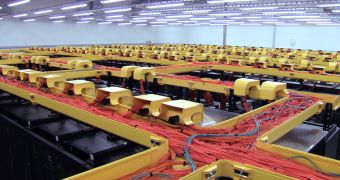The Top500 list has just been updated, and there is a certain high-ranking system that deserves attention for more than just its raw performance.
This time, we aren't going to praise the SuperMUC supercomputer for being the fastest Intel-based HPC system, or for being Europe's best entry on that list. We did enough of that when we covered the update and the Sequoia.
Instead, we've taken the time to look more closely at the LRZ SuperMUC due to its use of IBM System x iDataPlex Direct Water Cooled dx360 M4 servers.
That's right, this is the first hot-water-cooled supercomputer, a concept that isn't as strange as it sounds, probably because “hot” is used a bit loosely.
Active components in the system are kept at bearable temperatures thanks to direct contact with waterblocks. The coolant can reach up to 113 degrees Fahrenheit, or 45 degrees Celsius.
"This year all the electricity consumed by state-funded institutions across Germany are required to purchase 100% sustainable energy," said Prof. Dr. Arndt Bode, chairman of the board, Leibniz Supercomputing Centre.
"SuperMUC will help us keep our commitment, while giving the scientific community a best-in-class system to test theories, design experiments and predict outcomes as never before."
For those unaware, around half of the energy consumed by air-cooled data centers and larger conglomerates goes into cooling, not the base hardware.
IBM's solution allowed SuperMUC to be 10 times more compact than it would otherwise have been, as well as 40% less power-hungry.
As a bonus, the hot water will be used to heat the buildings in the Leibniz Supercomputing Centre campus during the winter, saving 1 million Euro / $1.25 million a year.
"As we continue to deliver on our long-term vision of a zero emission data center we may eventually achieve a million fold reduction in the size of SuperMUC, so that it can be reduced to the size of a desktop computer with a much higher efficiency than today," said Dr. Bruno Michel, manager, Advanced Thermal Packaging, IBM Research.

 14 DAY TRIAL //
14 DAY TRIAL // 